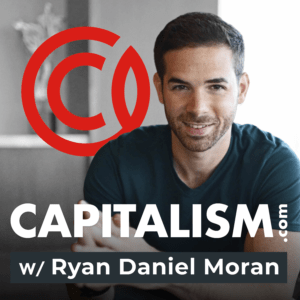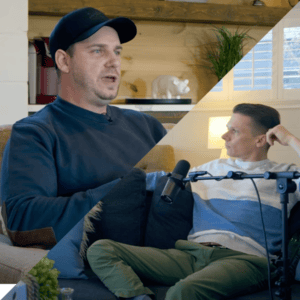Carl Allen is a U.K. based business buyer specializing in leveraged buyouts (LBO). Over 26 years he has perfected a proprietary methodology for buying business without using any of his own money.
Today he shares how to find deals, what he looks for how he structures them so that the businesses he buys are not dependent on him, and how he sleeps with all of this overhead!
You’re skeptical.
You hear of people buying businesses all the time - but doing so without personally investing any money? That sounds too good to be true.
Especially when you’re slaving away at your own business and you’re struggling to turn profits.
But it’s not an urban legend.
In fact, once you realize that there are two paths to entrepreneurship, your perspective will completely change. You’ll realize that you can either build your business from the ground up, or you can buy an existing business and take it to the next level.
The latter is (by far) a no brainer. Why?
You’ll find that you can reach success very quickly. You’ll see that you can run the business easily and you won’t have to incur as much risk as starting from scratch to do so.
Are you now curious about how to buy a business?
Check out this genius method shared by Carl Allen.
THE BEST TYPES OF BUSINESSES TO BUY
According to Carl, one of the easiest ways to fail in buying a business is to buy one where the success of the business depends almost entirely on the owner being there.
It just won’t work.
You may be wondering how to avoid these and it’s actually pretty simple.
The secret to finding a business that will truly thrive is to simply focus on businesses with revenues in the sweet spot of one to five million dollars.
Below a million, you run into major issues where the business is its owner. Remove him or her and the empire crumbles. This is typically true of brick and mortar stores, and less true with online ones.
Above five million dollars in revenue, you’re competing with the bigwigs – trade buyers, competitors, and small private equity firms. For an entrepreneur looking to grow a portfolio of businesses, one to five million-dollar targets undeniably win the day.
Beyond revenue, you’ll also want to consider the sector. Interested in a gas station but you’ve never worked in that space before? You might want to think twice before doing so. Work for a large IT company? Buy a small IT company. Are you an engineer by trade? Buy a small engineering company. Why? Because you’ll undoubtedly be able to add value to it through your existing network and your technical know-how, helping you to eventually sell it for even more. Stay in your lane.
IT, engineering, manufacturing or professional services are all prime sectors for an LBO while real estate is not.
PICKING A SELLER THAT IS HUNGRY TO SELL AT A DISCOUNT
Finding the right business to buy is only a piece of the puzzle. If you’re looking to score big, you’ll also want to dig into the mind of the seller.
Understanding the psychology of the seller is like a “cheat sheet” for getting you the best deal in town.
If you’re buying a business, you can use psychology to understand the motivations of the seller. If you’re looking to make a purchase, you can use psychology to cater to the longer-term needs of the seller. You’re looking to tick all the boxes of the seller and psychology will help you to do so.
How so?
You’ll want to focus on owners who are highly motivated to exit their business and who truly care about its continuity. So instead of the 25-year old Amazon entrepreneur, you’d rather target the baby boomer that’s built a solid business with great customers and employees and is looking to leave a legacy.
LBO DEAL DYNAMICS: HOW A LEVERAGED BUYOUT WORKS
Now for the big surprise.
You really can buy a business without investing any of your personal money. Here’s how:
Business X brings in a million dollars in revenue, and it makes a few hundred thousand dollars a year in free cash flow.
You’ll want to know its free cash flow because this is a tremendously useful measure of a company’s true profitability and it is more useful than net income. In its simplest form, free cash flow = cash flow from operations – capital expenditures.
Last year, businesses within the one million in revenue level sold at a little under 3 times their cash flow.
Let’s assume you are paying five hundred thousand dollars in cash for the one million dollars in revenue business. Two hundred thousand is due at closing and the remaining three hundred thousand can be paid over 3 years at a hundred thousand a year.
In order to finance this business, you can do the following:
For the two hundred thousand dollar deposit, you can either use debt, i.e. a loan from the SBA or a traditional bank using the business’ assets or cash flows as collateral or, if it’s a brick and mortar business, you can use assets like inventory and receivables as collateral.
For the balance of 3, one hundred thousand dollar payments, you would use the company’s cash flows to pay it off. That’s the beauty of an LBO – you look for strong assets and great cash flows and pay off a portion of the deal in the future. No personal money. Great business opportunities. It works like clockwork.
THE BOTTOM LINE ABOUT HOW TO BUY BUSINESSES WITHOUT INVESTING YOUR PERSONAL MONEY
Is it possible? Absolutely, but only if you target the right-sized business.
Like anything worthwhile, it takes hard work and planning.
Beyond buying the business, you have to also think about the day to day operations. In Carl’s experience, his most successful deals have been where there’s been a solid number two leader that could step up as the GM.
With this simple 3 step formula i.e. deals that serve you or your background, a grasp of the seller’s psychology and an assessment of the business’ potential for an LBO (financials, management), you’ll be well on your way to buying a profitable business without touching your bank account.
What could be better than that?





